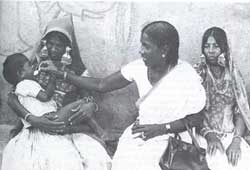Medicare perverted
 "THE limitations of present health activities are only a reflection of the modern system of medicine (which) has not yet developed a way of dealing with health problems at the social level," says the book. This yawning gap between academic and ground reality is what it aims to plug. Using relevant data, including government reports and research studies, each of its four sections fleshes out its thesis from different but interrelated directions.
"THE limitations of present health activities are only a reflection of the modern system of medicine (which) has not yet developed a way of dealing with health problems at the social level," says the book. This yawning gap between academic and ground reality is what it aims to plug. Using relevant data, including government reports and research studies, each of its four sections fleshes out its thesis from different but interrelated directions.
The first section looks at the problem of ill health in a rural community by placing it within the socio-economic fabric of people's lives: the nature of inequalities, the reason for it and how it affects health. The authors also consider the problems of health workers and activists working in a rural community.
The second section traces the development of allopathic medicine and the social forces shaping it. Allopathic medicine focuses mainly on disease-specific treatment, thus ignoring the main causative factor of illness -- living conditions. Medicare is a billion dollar business in the US today; the authors use the story of its wildfire growth to show how profits play a major role in determining how medicare is provided.
They tackle the questions of how health services evolved in post-Independence India, and how the process of development distorted it beyond philanthropic recognition in the third section; it also focuses on issues like malnutrition, drug use and abuse, the family planning programme and the health of vulnerable sections with special emphasis on women and children.
The strength of the fourth section lies in its employing the varied experiences of health workers to address beginners. "On the one hand." say the authors, "they see the limitations of carrying out health activities without getting involved in attempts to bring about social change. On the other hand, they realise the limitations placed on them by their training in getting involved in social issues." With the looming privatisation of health care and the government whittling down health expenditure, who will take care of the less fortunate?
Rama Baru is assistant professor at the Centre for Social Medicine and Community Health, Jawaharlal Nehru University, Delhi
